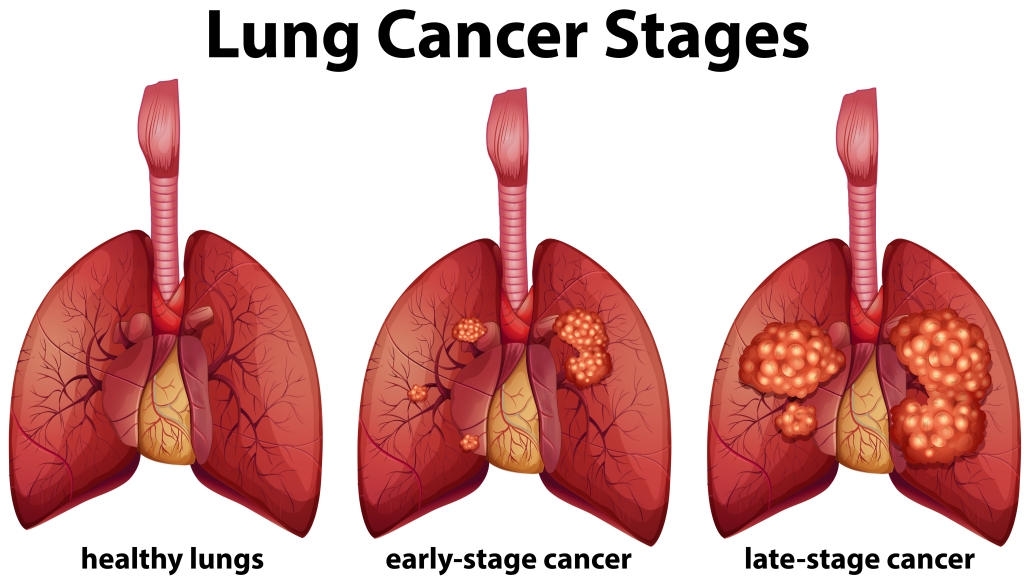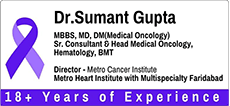Does Chemo Work For Stage 4 Lung Cancer?

Lung cancer is a widespread global issue, impacting millions of people annually. It’s among the most prevalent cancers diagnosed worldwide, leading to significant mortality rates. Lung cancer is categorized into various stages based on tumor size and spread. These stages range from 0 to 4, where Stage 4, also known as advanced or metastatic lung cancer, indicates the cancer has spread extensively to distant parts of the body. Globally, Stage 4 lung cancer poses significant challenges due to limited curative options.
A diagnosis of Stage 4 lung cancer can be overwhelming, often accompanied by questions about treatment options and their effectiveness. Chemotherapy is a commonly recommended treatment, but does it work for Stage 4 lung cancer? Let’s explore.
What Do You Mean By Stage 4 Lung Cancer?
Stage 4 lung cancer means the cancer that began in the lungs has spread far beyond to other parts of the body. It’s a severe stage where the cancer has reached distant areas like other organs. At this point, treatments focus on easing symptoms and slowing cancer’s growth rather than curing it. It’s challenging to treat because it has spread widely. Patients might face various symptoms as cancer affects different parts of their body, needing care to make them feel better rather than completely curing the cancer.
Dr. Sumant brings a wealth of experience, compassion, and advanced treatment methods for lung cancer. His focus on personalized care and understanding patient needs has helped many navigate their cancer journey with comfort and hope. With a commitment to staying updated on the latest therapies, Dr. Sumant is known for his dedication to improving the lives of those fighting this disease.
What Is The Role of Chemotherapy?
Chemotherapy, or “chemo,” is a cancer treatment that uses drugs to kill fast-growing cancer cells or prevent them from multiplying. It’s administered through pills or intravenous injections, entering the bloodstream to reach cancer cells. Here’s its role:
- Attacking Cancer Cells: Chemo drugs target and destroy cancer cells, impeding their ability to grow and divide.
- Shrinking Tumors: It aims to reduce the size of tumors, which can relieve symptoms.
- Preventing Spread: Chemotherapy may help prevent cancer from spreading or slowing its growth.
- Used in Combination: Often paired with other treatments like surgery or radiation to increase effectiveness in fighting cancer.
What Is The Effectiveness of Chemotherapy?
Chemotherapy’s effectiveness in treating cancer varies widely. For some, it leads to remission, shrinking tumors, and stopping cancer spread. However, it may be less successful in other cases, slowing down cancer growth or controlling symptoms. Its impact depends on the cancer type, stage, and the patient’s overall health.
Combining chemotherapy with other treatments like surgery or radiation often boosts its effectiveness. Nevertheless, it’s essential to acknowledge potential side effects, such as hair loss and fatigue, which can affect individuals differently. Healthcare providers evaluate its efficacy based on each patient’s situation and treatment response.
“Chemotherapy plays a crucial role in Stage 4 Lung Cancer treatment. It’s designed to target and slow down fast-growing cancer cells. While it may not always cure the disease, it aims to alleviate symptoms, shrink tumors, and prevent cancer spread. Each patient’s response varies, but combining chemo with other therapies can significantly improve treatment outcomes,” explains Dr. Sumant, emphasizing its importance in managing the condition.
What Are The Treatment Goals?
Treatment goals for cancer encompass:
- Elimination or Control: Targeting cancer to make it disappear or prevent its growth.
- Enhanced Quality of Life: Maintaining comfort, minimizing side effects, and improving well-being during treatment.
- Symptom Relief: Alleviating pain and discomfort caused by cancer and its treatments.
- Prolonged Survival: Extending life expectancy by containing or managing cancer.
- Preventing Spread or Recurrence: Minimizing the risk of cancer spreading to other body parts or reappearing after treatment.
- Tailored Care: Personalizing treatment plans to suit individual needs, health status, and preferences for optimal outcomes.
Neha Patel expressed, “I was diagnosed with Stage 4 lung cancer, and it felt like my world turned upside down. Dr. Sumant’s compassionate approach and expertise guided me through the toughest times. His personalized treatment plan and constant support gave me hope. Today, I’m grateful for his care, and while the journey isn’t easy, his dedication made it manageable.”
What Are The Considerations And Side Effects?
During cancer treatment, various factors and potential side effects are considered:
- Side Effects: Chemotherapy often causes hair loss, nausea, fatigue, and increased infection susceptibility.
- Mental Health: Coping with emotional distress, anxiety, or depression during treatment.
- Physical Changes: Managing changes in appearance, appetite, or weight.
- Financial Impact: Addressing the costs involved in treatments and healthcare.
- Lifestyle Adjustments: Adapting to lifestyle changes like diet modifications or activity limitations.
- Support Systems: Utilizing support from family, friends, or counseling services for emotional and practical assistance throughout the treatment journey.
How Much Does Lung Cancer Treatment Cost in India?
The typical package for lung cancer treatment in India ranges from 18,00,000 INR to 20,00,000 INR (18000 USD to 20000 USD). This comprehensive package covers a range of services, including thorough pre-treatment assessments, fitness evaluations for the patient, advanced investigations, surgical procedures, and hospital accommodations for the patient and their support system. Nevertheless, the treatment expenses in India can differ depending on the type of cancer, its stage, and various other factors.
| Treatment Type | Cost Range (USD) | Cost Range (INR) |
| PET Scan | USD 300 – USD 350 | INR 23,000 – INR 26,000 |
| Lung Cancer Surgery | USD 3,500 – USD 7,000 | INR 2,63,000– INR 5,26,000 |
| Chemotherapy (One Cycle) | USD 500 – USD 1,000 | INR 38,000– INR 75,000 |
| Radiation Therapy | USD 3,500 – USD 5,500 | INR 2,63,000– INR 4,13,000 |
| Radiosurgery | USD 5,000 – USD 10,000 | INR 3,76,000– INR 7,52,000 |
Below is the city-wise lung cancer treatment cost in India:
New Delhi – USD 1,200 – USD 30,500
Hyderabad – USD 1,200 – USD 27,800
Kolkata – USD 1,300 – USD 30,800
Gurgaon – USD 1,200 – USD 30,500
Bengaluru – USD 1,300 – USD 32,600
Pune – USD 1,200 – USD 30,500
Kochi – USD 1,200 – USD 30,500
Chennai – USD 1,200 – USD 28,300
Mumbai – USD 1,200 – USD 32,900
Conclusion
While chemotherapy may not cure Stage 4 lung cancer, it plays a vital role in managing the disease, controlling symptoms, and improving quality of life. Understanding its role and potential benefits and discussing treatment options with healthcare professionals can help patients make informed decisions about their care.
Remember, every patient’s situation is unique. Research advancements and individual responses to treatment contribute to ongoing improvements in managing Stage 4 lung cancer.
FAQs
-
Is Chemotherapy Painful?
Chemotherapy itself is not painful, but some side effects, like soreness at the injection site or discomfort during intravenous infusion, may occur.
-
Does Chemotherapy Cause Hair Loss?
Chemotherapy can result in hair loss, though not all drugs cause this side effect.
-
How Long Does Chemotherapy Treatment Last?
Treatment duration varies, usually a few weeks to several months, contingent upon the treatment plan’s specifics and individual response.
-
Can Chemotherapy Affect Fertility?
Chemotherapy drugs might affect fertility, causing temporary or permanent infertility. Discuss fertility preservation options with your healthcare provider before starting treatment.
-
Are There Alternatives to Chemotherapy for Stage 4 Lung Cancer?
Besides chemotherapy, targeted therapies, immunotherapy, and palliative care are alternative treatments that may benefit Stage 4 lung cancer patients. Consulting an oncologist helps explore suitable options.
Read More : What Are The Common Symptoms Of Breast Cancer?
